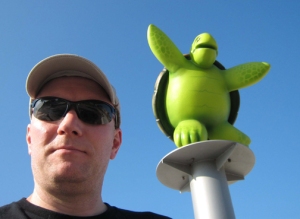by David Gitomer
{Graduate Liberal Studies Life}
I’ve been helping to steer the ship of DePaul’s Master of Arts in Liberal Studies Program
for about a decade now. We’re a graduate liberal studies program for adults, which means that people out of college, mostly working, choose us to get to someplace that college didn’t take them. They want that cultural knowledge, those intense conversations about ideas, justice, politics, spirituality. They want to do research that goes deeper than googling. They want to lead the conversation in a voice that is grounded and informed.
We’re organized around a set of Core Courses, followed by electives that students choose, and culminating in a final project that sums up the journey or sets out for lands unknown. The Core Courses get students to think about the world they encounter in interdisciplinary ways. They draw on the tools from many different academic disciplines, from sociology and history to gender studies and religion.
Everyone loves the titles and most people (!) love the content. “Visions of the Self” “Perceptions of Reality” “Representations of the Body” “The American Experience” “The City” These titles have been rolling around in our program for a long time, though the content of course has been refreshed quite a lot. We’ve considered altering the Core many times, but the courses are flexible and each different faculty member makes his or her version come alive with unique content, so we never had the strong motivation to make changes.
But this year we’re adding a new one: ENVIRONMENT AND SOCIETY. Actually, the inspiration came last year when Susan Jacobs and I attended the Association of Graduate Liberal Studies Programs annual conference in Vancouver, BC. “Culture, Consciousness and Nature—A Context for Climate Change.” This got me to thinking: What makes a “Core Course”? I think it should deliver a fundamental chunk of human experience AND give you primary approaches to thinking about the chunk. Climate change is indeed the burning issue of our time, connecting with just about every global issue I can think of. But even more profound issues lurk beneath the policy questions and debates about climatology. What is the environment? Is it something “out there” that needs to be protected from “us”? Or are we a part of it? If we are, what does that mean for what we call “environmentalism”?
The chosen instructor for this new course is Randy Honold, a Ph.D. in philosophy who is also assistant dean in DePaul’s College of Liberal Arts and Sciences, and a founding member of DePaul’s Institute for Nature and Culture.
Randy says:
“I’m very excited – and probably a little delusional – to lead an exploration of the topic of environment and society this winter quarter for the newest MALS course of the same name. I have to admit it’s hard for me to imagine a more quixotic adventure. When you get down to it, what isn’t environment, society, or something of both? Add to this the fact that perhaps no topic is more in need of exploring, with significant changes to the planet’s natural systems, and therefore to human societies, coming in the foreseeable future.
“None of us has a complete handle on the complex relationships among humans, nature, and the processes by which we are intertwined. There are multiple frameworks through which we structure and understand these relationships. And things are always changing: scientific knowledge, social needs, political exigencies. I figure it’s our job to enter into the discourse where and when we can, with our curiosity, concern, and commitments lighting the way.
“The main goal of the course is to do just this. We’ll think through what it means to be both a part of and apart from the environment. We’ll become better analysts of environmentalist (and anti-environmentalist) discourses. We’ll look at the role of ecological science and its truth-claims. We’ll examine the role of the arts in envisioning new possibilities for human dwelling on the planet. We’ll consider new kinds of politics suited for impending pressures.
“I’m going to prepare a context where all of us in the course can talk to and learn from each other. I hope that everyone emerges energized, not enervated, by the experience!”

